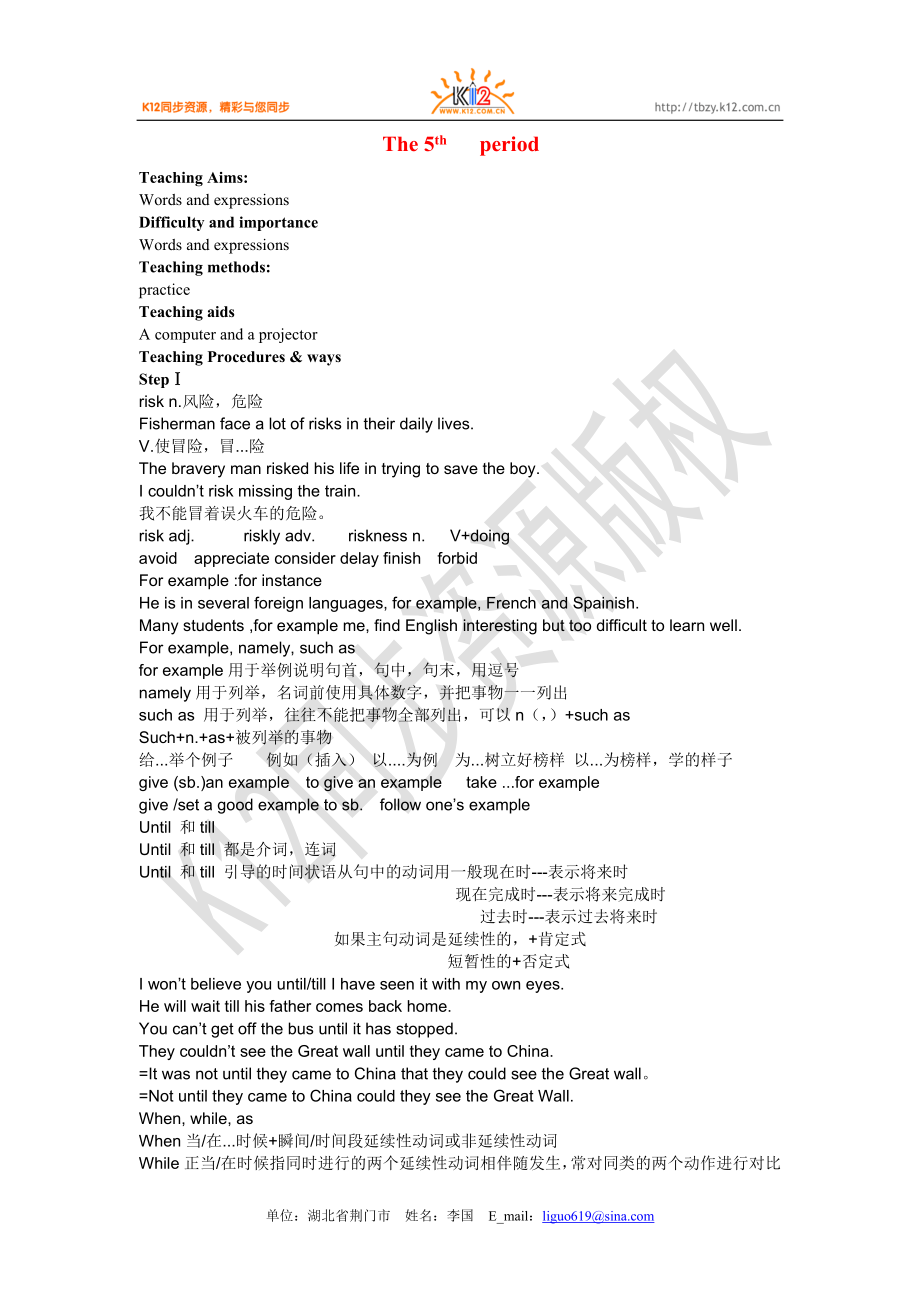《高二英語(選修六)unit 3 課時(shí)教案The 5th period》由會(huì)員分享��,可在線閱讀��,更多相關(guān)《高二英語(選修六)unit 3 課時(shí)教案The 5th period(2頁珍藏版)》請(qǐng)?jiān)谘b配圖網(wǎng)上搜索����。
1、
The 5th period
Teaching Aims:
Words and expressions
Difficulty and importance
Words and expressions
Teaching methods:
practice
Teaching aids
A computer and a projector
Teaching Procedures & ways
StepⅠ
risk n.風(fēng)險(xiǎn)����,危險(xiǎn)
Fisherman face a lot of risks in their daily lives.
V.使冒險(xiǎn),冒...險(xiǎn)
The
2�����、bravery man risked his life in trying to save the boy.
I couldn’t risk missing the train.
我不能冒著誤火車的危險(xiǎn)。
risk adj. riskly adv. riskness n. V+doing
avoid appreciate consider delay finish forbid
For example :for instance
He is in several foreign languages, for example, French and Spai
3��、nish.
Many students ,for example me, find English interesting but too difficult to learn well.
For example, namely, such as
for example用于舉例說明句首�,句中,句末��,用逗號(hào)
namely用于列舉�,名詞前使用具體數(shù)字,并把事物一一列出
such as 用于列舉���,往往不能把事物全部列出��,可以n(�,)+such as
Such+n.+as+被列舉的事物
給...舉個(gè)例子 例如(插入) 以....為例 為...樹立好榜樣 以...為榜樣���,學(xué)的樣子
4�、
give (sb.)an example to give an example take ...for example
give /set a good example to sb. follow one’s example
Until 和till
Until 和till 都是介詞��,連詞
Until 和till 引導(dǎo)的時(shí)間狀語從句中的動(dòng)詞用一般現(xiàn)在時(shí)---表示將來時(shí)
現(xiàn)在完成時(shí)---表示將來完成時(shí)
過去時(shí)---
5�、表示過去將來時(shí)
如果主句動(dòng)詞是延續(xù)性的,+肯定式
短暫性的+否定式
I won’t believe you until/till I have seen it with my own eyes.
He will wait till his father comes back home.
You can’t get off the bus until it has stopped.
They couldn’t see the Great wall until they came to China.
=It
6�、was not until they came to China that they could see the Great wall��。
=Not until they came to China could they see the Great Wall.
When, while, as
When當(dāng)/在...時(shí)候+瞬間/時(shí)間段延續(xù)性動(dòng)詞或非延續(xù)性動(dòng)詞
While正當(dāng)/在時(shí)候指同時(shí)進(jìn)行的兩個(gè)延續(xù)性動(dòng)詞相伴隨發(fā)生,常對(duì)同類的兩個(gè)動(dòng)作進(jìn)行對(duì)比
As當(dāng)時(shí)�����,不指先后���,強(qiáng)調(diào)同時(shí)發(fā)生
在較長(zhǎng)時(shí)間背景情況時(shí)可互換
It was snowing when we go to the station
7����、.
We went home when we had finished our homework.
As I looked back, someone came near.
As/when/while I was walking down the street ,I noticed a police car in front of our building.
Why��! I have nothing to confess.___you want me to say?
AWhat is it that BWhat it is that
CHow is it that D
8���、how it is that
考查強(qiáng)調(diào)句式�。被強(qiáng)調(diào)部分是特殊疑問詞what����,所以使用疑問句語序:疑問詞+is it that +其余部分
普通句式What do you want me to say?
no more ...than ... not more...than
no more ...than ...和一樣不(兩者都否定)
no more than+ num 至多...僅僅(強(qiáng)調(diào)少)
not more... than 不如,沒有到的程度(前者不如后者)
not more than +num.不多于��,不超過(不強(qiáng)調(diào)少��,沒感情色彩)
Jack is no more dil
9�、igent than John.
杰克不勤奮���,約翰也一樣不勤奮。
I could do it no more than you.
我和你一樣不能做那件事��。
Jack is not more than diligent than John.
杰克不如約翰努力�����。
It’s dangerous to get close to a person with AIDS.
Close adj. Adv. & vt.
Close與closely
Close作adv.在附近��,密切的��,修飾由介詞引導(dǎo)的短語��,表具體的概念
Closely作adv.密切的�����,修飾動(dòng)詞或過去分詞�����,有抽象意義
It was raining heavily. little Mary felt cold, so she stood ____to her mother.
A close B closely
C closed D closing
單位:湖北省荊門市 姓名:李國(guó) E_mail:liguo619@
 高二英語(選修六)unit 3 課時(shí)教案The 5th period
高二英語(選修六)unit 3 課時(shí)教案The 5th period

